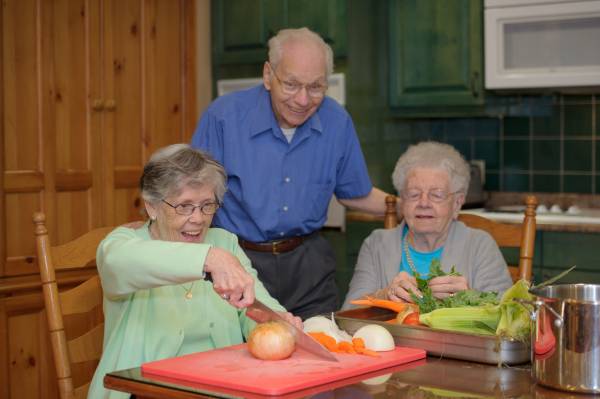
Fiber is found in fruits, vegetables, beans and peas, grains, nuts, and seeds. High fiber foods are usually low in calories and fat, but packed with vitamins and minerals. It is recommended for men 50+ years old to get 30 grams of fiber per day and for women 50+ to get 21 grams of fiber per day.
Fiber at Work
Fiber helps fight heart disease by lowering cholesterol levels. Eating high fiber foods like beans, oats, barley, almonds, and walnuts can help some seniors lower their cholesterol. A high fiber diet can also help lower the chance of getting certain types of cancers, such as colorectal cancer.
Diabetes is another health concern for several senior adults. If you have diabetes, fiber can help control your blood glucose levels. Fiber slows the breakdown of nutrients. This allows glucose from foods to move into the blood little by little. Overall fiber in whole grain foods helps prevent constipation. Fiver moves waste through the body and lowers the risk of hemorrohoids.
Foods with Fiber
Fiber rich foods may help you manage your weight. A high fiber diet is often lower in calories, and fiber rich foods make you feel full for longer. Whole grains, fruits and vegetables, beans and peas, and nuts and seeds are all great foods that are high in fiber.
Enjoy these fiber-rich food ideas
- Whole grain cereal for breakfast
- Top cereal or pancakes with fruit
- Choose whole fruits more often than juices
- Toss dried fruits and nuts into salads
- Use whole wheat flour in baked goods
- Add chickpeas, kidney beans, or your favorite beans to salads, soups or stews
Add fiber to your eating routine
The following tips help you make fiber part of your daily meals and snacks. Start slowly, adding fiber to your diet too quickly can cause pain. Add a few fiber rich foods each day until you meet your goal. Drink more water because it will keep fiber moving through your digestive tract. Eat a variety of fiber rich foods to get all the nutrients your body needs each day. Including fiber in every meal will help to meet your daily fiber needs throughout the day.
Learn More:
It is important to monitor nutritional needs as one ages. At United Methodist Homes we work with our residents to meet their needs. To learn more about our senior care facilities and what we offer please visit our website or contact us here!
*Information based off of American Dietetic Association pamphlet

